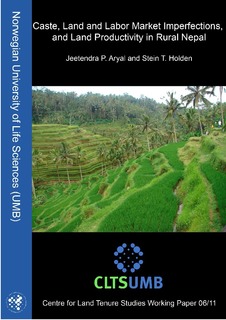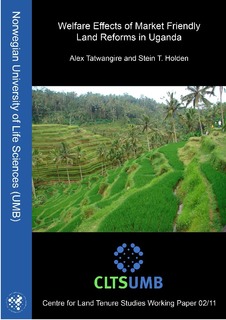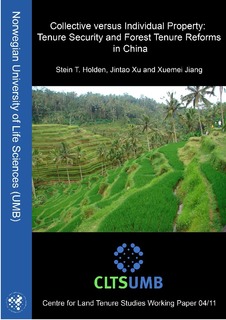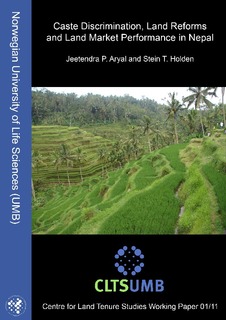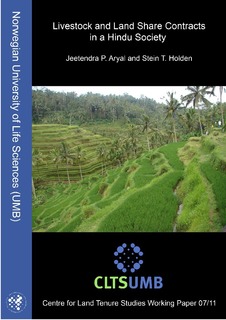Location
The Centre for Land Tenure Studies was opened at the Nowegian University of Life Sciences (NMBU) on the 27th of June 2011 resulting from a joint initiative by researchers at the Department of International Environment and Development (Noragric), the School of Economics and Business, and the Department of Landscape Architecture and Spatial Planning. In 2012 was joined by the Department of Ecology and Natural Resource Management.
Mission
The Centre for Land Tenure Studies (CLTS) at NMBU is established to further the study of land tenure. Land tenure studies define a broad and complex field of study cutting across many disciplines. For CLTS this entails, but is not limited to, the following activities:
- Provide a common arena for discussing land tenure issues, including a series of seminars directed to present new research or important theoretical perspectives. This may be designed as part of an educational program.
- Promulgate a joint series of working papers.
- Support international publication of articles and books.
- Develop and conduct joint courses at both Master and PhD level.
- Initiate and support exchange of researchers.
- Participate in research networks related to land tenure.
- Maintain a public list of collaborating institutions and researchers.
- Initiate and develop applications for research funds to support basic research on land tenure both by our own efforts and in collaboration with other research groups working on land tenure questions.
In its activities the centre will use English as its working language as far as practically possible. In short we may say that the mission of the Centre for Land Tenure studies is to enhance collaboration across departments at NMBU; to strengthen the visibility of NMBU activities within the field of land tenure; to strengthen NMBU’s international collaboration and networks within the field; to contribute to research and knowledge generation on land tenure issues; to help build capacity in the South and in Norway within the field; to disseminate policy lessons, and to contribute to policy debates.
Resources
Displaying 61 - 65 of 67Caste, land and labour market imperfections, and land productivity in rural Nepal
This paper provides new evidence on the caste-related land productivity differential and its explanations in rural Nepal using household plot panel data. Low-caste households are found to have significantly higher land productivity on their owner-operated plots as compared to high-caste households. A comparison between the rented in land of low-caste and the owneroperated land of high-caste households showed that the former has significantly higher land productivity. No significant Marshallian inefficiency was found in the case of low-caste tenant households.
Welfare Effects of Market Friendly Land Reforms in Uganda
This article estimates the poverty reducing impact of the recent land reforms and land transfers in the different land tenure systems of Uganda. Using balanced panel data for 309 households in 2001, 2003, and 2005, models that control for unobserved household heterogeneity and endogeneity of land acquisition and disposition are employed to measure the poverty-reduction effect of land on household expenditure per adult equivalent.
Collective versus individual property : tenure security and forest tenure reforms in China
This study assesses the determinants of forest land allocation to households in the forest tenure reforms in China in the period 1980-2005 using data from three provinces in Southern China; Fujian, Jiang Xi and Yunnan. Furthermore, it assesses the current level of tenure security on forest land and how this tenure security is affected by past and more recent policy changes.
Caste discrimination, land reforms and land market performance in Nepal
The caste system is an intricate part of the institutional structure as well as class formation, political instability and conflicts in Nepal. The most severely discriminated group in the caste system is the Dalits, the so-called “untouchables”. Dalits faced religious, occupational and even, territorial discrimination. They were traditionally excluded from receiving education, using public resources, and had no rights to own land (Dahal 1995; CHRGJ 2005; Haug, Aasland and Dahal 2009).
Livestock and land share contracts in a Hindu Society
This paper examines factors related to the existence of a livestock rental market in western Nepal and assesses whether this is associated with caste differentiation and land rental market participation. This study brings new empirical evidence of livestock rental market against the established view that such market does not exist due to moral hazard.








